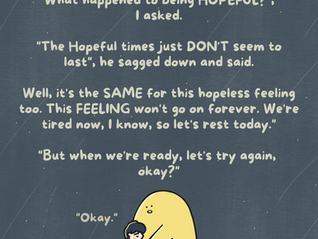WORKSHEET: Decatastrophising
- Hernping
- Mar 22, 2023
- 2 min read
Updated: Mar 31, 2023
A Cognitive Practice for our "worst case" scenarios.

What is Catastrophizing?
Catastrophizing is a very common type irrational thinking – or what’s known as cognitive distortions in Cognitive Behavioral Therapy (CBT) literature. Such cognitive distortions often affect the way we feel and act without us being fully conscious of them. Having such types of thoughts are a very normal part of being human. However, when we have too many of such thoughts, they can be harmful to us.
Catastrophizing is when the importance of a problem is exaggerated in our minds. The worst possible outcome is assumed to happen.
The below practice is a thought exercise to question such thoughts, so we can have a more objective view of the problem.
I'll share an example of a common situation facing deadlines okay?
1. What are you worried about?
I've worried that I won't be able to finish my project or assignment on time. And that I might get scolded or punished for it.
Or even judged by my colleagues and manager.
2. How likely is it that your worry will come true? Give examples of past experiences, or other “evidence” to support your answer.
This rarely happens. There were times that I was reprimanded but I guess not in the worst of my imagination. Usually no one seems to actually notice.
3.If your worry does come true, what’s the worst that could happen?
That this time my boss will notice and finally fire me. I've been feeling like an imposter after all.
4.If your worry does come true, what’s most likely to happen?
Probably just that my boss will ask me why and figure out with me what went wrong.
5.If your worry does come true, what are the chances you’ll be okay in:
One week? ___ 70%
One month? ___90%
Six months? ____99.999%
.jpg)















Comentarios